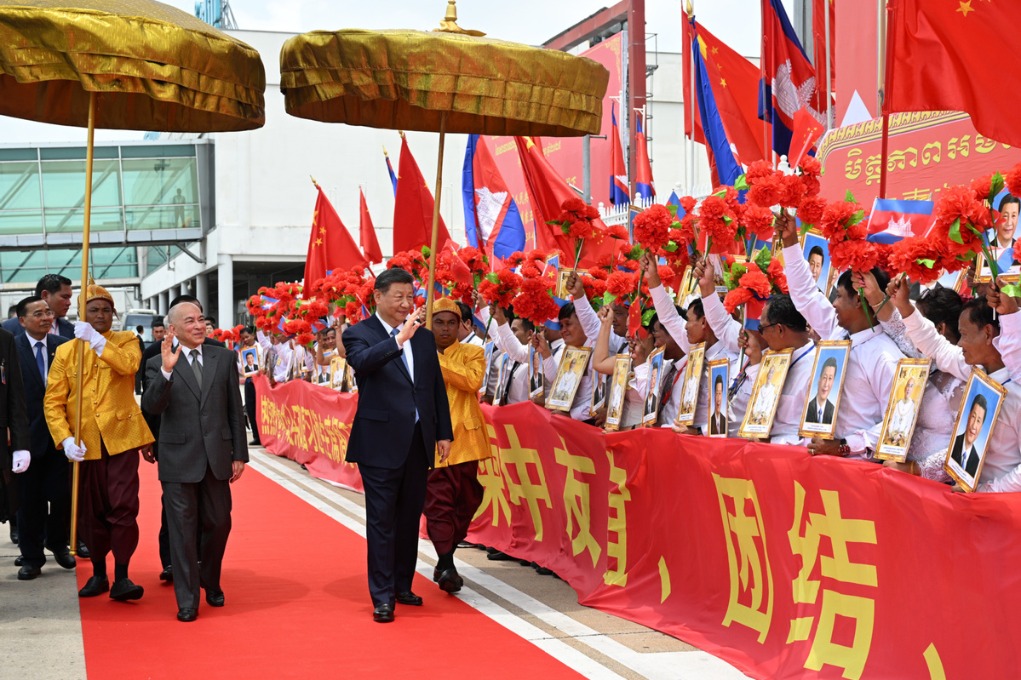Bandung continues to show the way


Despite international relations being in a state of uncertainty and chaos, the evolution of security practices in the Global South gives hope
This year marks the 70th anniversary of the Bandung Conference, the first international meeting of leaders from Asian and African nations. It also marks the 80th anniversary of the end of World War II and the establishment of the United Nations. However, the Ukraine crisis and the Gaza conflict have once again placed global peace at a crossroads.
This year is also the 30th anniversary of the founding of the World Trade Organization, while the Donald Trump administration's trade war with the rest of the world has undermined the fundamental principles of free trade, bringing global prosperity to yet another historical crossroads.
Looking back, international relations were similarly fraught with risks and uncertainties 70 years ago. In February 1955, the United States, borrowing the NATO model, established the Southeast Asia Treaty Organization in the Asian region and in the same year created a military alliance in the Middle East called the Baghdad Pact. The Cold War and ideological blocs cast a huge shadow over the Asia-Pacific and African regions. The Bandung Conference became a milestone for newly independent nations to raise their collective voice in the post-colonial era.
Seventy years later, in the face of the current chaotic state of international relations, we must approach the meaning of the Bandung Conference from historical and strategic perspectives, especially within the context of the Global South's collective rise, an unprecedented development in over a century. Understanding the Bandung Conference in this light allows us to recognize it as the starting point for the non-Western world's exploration of global peace, and it also serves as the historical and intellectual foundation for the Global South security concept.
First, the Bandung Conference laid down the principle of respecting the diversity of international actors, establishing that only by constructing truly equal and inclusive new norms can sustainable international relations be ensured. After the Industrial Revolution, Western countries expanded globally, and defined their governance models as standards for judging international relations. Western nations established treaties based on the principle of sovereign equality. Meanwhile, countries that did not meet Western standards in governance structures were forced into unequal treaties. For regions deemed "uncivilized", colonization was justified as a "civilizing mission". At that time, international society was limited to the "civilized "Western nations. After World War II, the ideological divisions of the Cold War continued this denial of international diversity, maintaining the basic structure of a hierarchical international system.
Against such a backdrop, the Bandung Conference helped set new standards and procedures for international relations. One of the major highlights of the Bandung Conference was the invitation extended to the newly established People's Republic of China, sending a clear signal that political systems and ideologies should not be barriers to the development of normal relations and international cooperation between nations on an equal footing. For decades, whether through the practices of the Association of Southeast Asian Nations or the Shanghai Cooperation Organization, the idea of equal, inclusive and cooperative security has always been upheld. China's Global Security Initiative clearly states that "all countries, big or small, strong or weak, rich or poor, are equal members of the international community". The initiative advocates the adherence to sovereignty, independence and equality. History has shown that inequality and injustice are key sources of imbalance in international relations and armed conflicts, as evidenced by the Ukraine crisis and the Gaza conflict.
Second, the Bandung Conference provided a basic framework for the relationship between regional nations and outside powers, offering a warning about the dangers of military alliances formed by outside powers, which could potentially escalate regional security issues. A key background to the Bandung Conference was the military alliances of Southeast Asia Treaty Organization established by the US. Advocates of the conference, such as then-Indian prime minister Jawaharlal Nehru, viewed the US-led Southeast Asia Treaty Organization as dangerous to peace. However, countries such as Thailand, the Philippines, Iran, Iraq, Turkiye and Pakistan, which participated in the Bandung Conference, were also members of the military alliances.
Faced with the risk of division over the issue of military alliances, the Bandung Conference adopted a principled and flexible approach. The fifth of the Bandung Principles outlined in the Bandung Conference's declaration underscored "respect for the right of each nation to defend itself singly or collectively, in conformity with the Charter of the United Nations", and the legitimacy of exercising this right under the framework of the UN is acknowledged. This means that the conference did not deny the right of attending countries to participate in military alliances for collective self-defense. However, the sixth principle clarified: "abstention from the use of arrangements of collective defense to serve the particular interests of any of the big powers, abstention by any country from exerting pressures on other countries".
Over time, we have seen some countries withdraw from alliances, while others have reduced their dependence on alliances by establishing independent regional organizations. Thailand, for example, has retained its military alliance with the US but actively participated in the establishment of ASEAN, finding a new international identity within the organization. ASEAN has consistently refused to become a collective defense military group, and it can be said that ASEAN has successfully inherited the spirit of the Bandung Conference. Similarly, the SCO has adhered to the principle of "partnership over alliance "from the outset, and its military exercises focus not on third countries, but on combating terrorism, separatism and extremism. China's Global Security Initiative clearly emphasizes the importance of respecting the legitimate security concerns of all countries, emphasizing that humanity is an indivisible security community, and one country's security should not come at the expense of others'. The history of security practices in the Global South demonstrates that the rejection of military alliances based on imagined enemies and deterrence has led to the establishment of a common regional home built on dialogue and negotiation to resolve security disputes. In fact, military alliances, exemplified by NATO, are not universal security solutions but rather exceptions.
At present, international relations are in a state of great uncertainty and chaos. However, based on the evolution of the security practices and ideas in the Global South, we are confident in the future of global security. This is the greatest significance of commemorating the 70th anniversary of the Bandung Conference.
The author is a professor at the School of International Studies at Nanjing University. The author contributed this article to China Watch, a think tank powered by China Daily.
The views do not necessarily reflect those of China Daily.
Contact the editor at editor@chinawatch.cn.


































